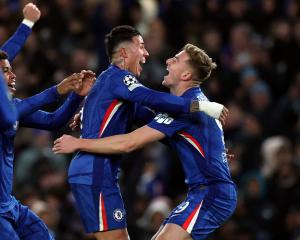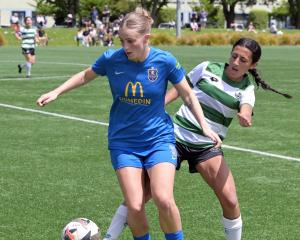Perhaps tinged with some disappointment in missing the New Zealand Football Championship play-offs on goal difference, Malcolm Fleming can still be satisfied with Otago United's performance this season.
Under the new coach's guidance, Otago better than doubled its haul of competition points, from eight in 2009 to 18 in 2010, and achieved a more balanced goal difference with minus-six, compared to minus-16 last season.
Fifth was certainly much better than second-last or last, which had been United's lot in the NZFC over the previous four seasons.
Adding flesh to statistics, Fleming's team consistently played with an attacking mindset, and at its best, produced cultured passing movements that the long-suffering Otago supporters appreciated.
Purists will warmly remember the 3-1 home win as Otago dismantled Wellington at Carisbrook, when goals by Dave Dugdale, Ryan Faichnie and Ben Light could have been doubled, such was Otago's superiority.
In the return match in Wellington, Otago notched a notable double, and again showed its teeth to beat coach Stu Jacobs' side 2-0, when Dugdale again got on the scorecard, along with Dan Ede.
Some Otago supporters initially scratched their heads when reading Fleming's team list, since several players - Faichnie and Ede, among others - were recruited from Christchurch, and were virtually unknown in Dunedin.
Historically, Otago has always had to import players to field a balanced team capable of competing at the highest level, and in fact no team in the NZFC is without a bunch of imports.
Fleming's masterstroke was in knowing the quality of the players he signed from Christchurch, and convincing them to make the arduous drive south to Dunedin in a van every other Friday night.
To their credit, the new players uncomplainingly logged up the miles, and more importantly, performed well on the field for Otago.
Compared to some of the expensive duds that Otago signed from overseas in previous years, the Christchurch crew were a breath of fresh air.
But what about local talent? Otago still fielded its battle-hardened campaigners such as Andy Coburn, approaching 100 NZFC games, captain and player of the year Tim Horner, steady defender Mike Smith and a young veteran in Tristan Prattley in his third consecutive season at the top level.
Left fullback Prattley so impressed northern pundits that he was selected several times in the NZFC team of the month in front of players of international status.
Otago's squad included at least 13 players who turn out for Dunedin clubs in the Footballsouth winter league.
As well as that group, there was the United Under-20 team which competed in the national youth league.
"If there is one small disappointment, it's that more of Otago's better young players did not take up the challenge and come to our training sessions from the start," Fleming said.
"The door was always open, and to play and train with top players is the only way for good youngsters to improve. Some did come along, but some chose not to bother."
Fleming sees the youth league as a good platform for ambitious players to be seen further north, where good players in the deep south have often been ignored.
Caversham keeper James Waggett was named United's young player of the year, and clearly deserved the award.
His sharp reflexes and agility were an integral part of Otago's defence.
Captain Horner drove the team forward, demanded maximum effort and was coolness personified in defence, where he was supreme in the air.
Another aerial expert was Chris Jenkinson.
Unfortunately, the Englishman had to return home in December, but his contribution was superb, and had he stayed, who knows how far Otago might have gone?Fleming also blooded several young players this season.
Youngsters are rare in the NZFC but Morgan Day, Cam Burns, Tom Connor, Harley Rodeka and Dave Shaw were among those exposed to the intensity of top football.
As a combined venture, Otago United gets almost no support from participating clubs.
Canterbury levies all its footballers to provide a basic cashflow, and it could be argued the time is ripe for Otago to move in that direction.
United's administration has yet to find out whether its entry for the next NZFC has been accepted, and while an enlarged 10-team competition is expected, that has still to be confirmed.
Negotiations are in progress regarding Fleming's future.
While he has not yet been appointed for a second year as Otago coach, he has already started planning his next campaign.









